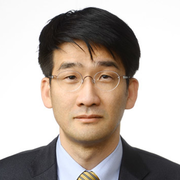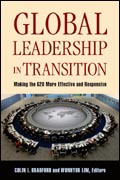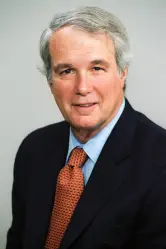Global Leadership in Transition calls for innovations that would “institutionalize” or consolidate the G20, helping to make it the global economy’s steering committee. The emergence of the G20 as the world’s premier forum for international economic cooperation presents an opportunity to improve economic summitry and make global leadership more responsive and effective, a major improvement over the G8 era.
“Key contributors to this volume were well ahead of their time in advocating summit meetings of G20 leaders. In this book, they now offer a rich smorgasbord of creative ideas for transforming the G20 from a crisis-management committee to a steering group for the international system that deserves the attention of those who wish to shape the future of global governance.”—C. Randall Henning, American University and the Peterson Institute
Contributors: Alan Beattie, Financial Times; Thomas Bernes, Centre for International Governance Innovation (CIGI); Sergio Bitar, former Chilean minister of public works; Paul Blustein, Brookings Institution and CIGI; Barry Carin, CIGI and University of Victoria; Andrew F. Cooper, CIGI and University of Waterloo; Kemal Dervis, Brookings; Paul Heinbecker, CIGI and Laurier University Centre for Global Relations; Oh-Seok Hyun, Korea Development Institute (KDI); Jomo Kwame Sundaram, United Nations; Homi Kharas, Brookings; Hyeon Wook Kim, KDI; Sungmin Kim, Bank of Korea; John Kirton, University of Toronto; Johannes Linn, Brookings and Emerging Markets Forum; Pedro Malan, Itau Unibanco; Thomas Mann, Brookings; Paul Martin, former prime minister of Canada; Simon Maxwell, Overseas Development Institute and Climate and Development Knowledge Network; Jacques Mistral, Institut Français des Relations Internationales; Victor Murinde, University of Birmingham (UK); Pier Carlo Padoan, OECD Paris; Yung Chul Park, Korea University; Stewart Patrick, Council on Foreign Relations; Il SaKong, Presidential Committee for the G20 Summit; Wendy R. Sherman, Albright Stonebridge Group; Gordon Smith, Centre for Global Studies and CIGI; Bruce Stokes, German Marshall Fund; Ngaire Woods, Oxford Blavatnik School of Government; Lan Xue, Tsinghua University (Beijing); Yanbing Zhang, Tsinghua University.
Authors
Edited by

Colin I. Bradford is a nonresident senior fellow in Global Economy and Development at the Brookings Institution and at the Centre for International Governance Innovation. Under President Bill Clinton he was chief economist and head of policy coordination and donor relations for the U.S. Agency for International Development. He is a coeditor (with Johannes Linn) of Global Governance Reform: Breaking the Stalemate (Brookings).
Wonhyuk Lim is director of policy research at the Center for International Development within the Korea Development Institute. He was with the Presidential Transition Committee and the Presidential Committee on Northeast Asia after the 2002 election in Korea. A former fellow with Brookings's Center for Northeast Asian Policy Studies, he has written extensively on development and corporate governance issues.

